Indigenous
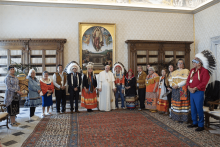
Pope Francis apologized to Canadian Indigenous peoples on Friday for the Roman Catholic Church's role in residential schools that sought to erase their cultures and where many children suffered abuse.
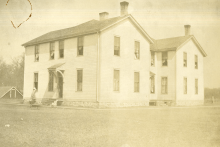
Across the nation, Catholic Church leaders are beginning to reckon with their institution’s role in operating Indigenous residential schools and the lasting consequences these schools left on Native American communities. One state seeing growing momentum to address this history is Minnesota, which had 15 boarding schools; Catholic groups operated at least eight of them.
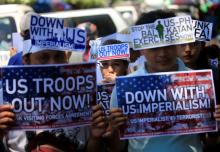
Due to climate change, people — entire tribes and cultures — are losing their homes and are being displaced from their lands. Indeed, the United States military needs to be held accountable for polluting the planet. For example, if preventive measures and legislation like the Green New Deal are not enacted to curb U.S. imperialism, more Indigenous peoples will perish due to climate disasters.

For Indigenous communities, the existence of these schools and the abuse, neglect, and murder committed within them are not new; Indigenous communities have been aware of — and harmed by — boarding schools, many of them run by Christian groups, for generations. And though Indigenous people have ideas about how Christian communities can atone for their involvement in the schools, many are not sure Christians are willing to listen.
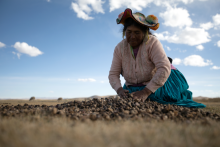
Modernity claims humans are the only citizens — the owners and rulers of nature – thus fracturing our relationship with nature and with one another as we compete to amass or inherit resources. This voracious system is built to protect those with wealth and their resources rather than to protect human and natural life. The deadly consequences of this paradigm are evident: Last month, the United States experienced the hottest June on record since we began keeping track 127 years ago.
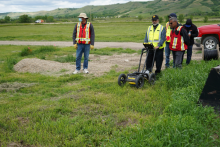
“I have spoken personally directly with His Holiness Pope Francis to press upon him how important it is not just that he makes an apology but that he makes an apology to indigenous Canadians on Canadian soil,” Trudeau told reporters in Ottawa.
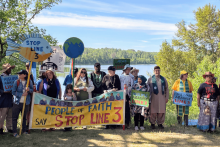
In 1855, the Ojibwe people signed a treaty in Washington, D.C., that retained extensive land use rights in the Great Lakes region for hunting, gathering, fishing, and worship rights for the community. Today, the Ojibwe, who live throughout Minnesota, North Dakota, Wisconsin, Michigan, and Ontario, Canada, still retain these 1855 treaty rights, which are separate from reservation land.
But the Line 3 Replacement Project is seeking to cut through the land, which activists say would directly violate those treaty rights.
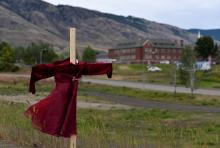
Indigenous leaders and school survivors on Sunday dismissed Pope Francis' expressions of pain at the discovery of 215 children's remains at a former Catholic residential school in Canada, saying the church needed to do much more.
In his weekly blessing in St. Peter's Square on Sunday, Francis said he was pained by the news about the former school for indigenous students and called for respect for the rights and cultures of native peoples. But he stopped short of the direct apology some Canadians had demanded.
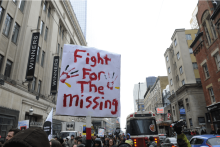
“On Missing and Murdered Indigenous Persons Awareness Day, we remember the Indigenous people who we have lost to murder and those who remain missing and commit to working with Tribal Nations to ensure any instance of a missing or murdered person is met with swift and effective action,” the proclamation reads.
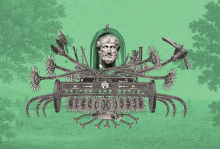
CHANGE IS DIFFICULT, great change even more so. Yet some things change naturally over time with seemingly little effort—the course of a river, the shore of an ocean, the direction a tree decides to grow. When humans interfere with the course of nature in an unnatural and thoughtless manner—such as by damming a river or clear-cutting a forest—we are bound to experience unknown and often unwanted consequences. But perhaps reverting to more natural systems of change will not be as difficult as we imagine.
Western civilization is just beginning to realize that nature is wiser and more powerful than we are and will, without a doubt, outlive us. She knows her mind, and she understands what keeps life in balance. Because today we seldom see nature in her unmolested glory, we rarely consider the degree to which Western civilization has changed that which is natural to what is now unnatural. Since time immemorial, Indigenous people have learned to observe natural change and tried to flow with it, or bend it to their benefit.
Now, like never before, we need people with keen observational skills to help us recover and retain the truths in nature. Indigenous wisdom’s long relationship with creation is based on an ethic of harmony, humility, and respect. Such efforts need not always contradict Western notions of science. Modern scientific methods often confirm the truths that our Indigenous teachers have always known. Science verifies what scientists observe. In more than one sense, our Indigenous elders have always been scientifically aware. Western scientists use tools that tell them the hydrological cycles have changed. Our elders know the huckleberries are ripening a month later than they always have. I have heard from elders in the past few years that our medicine plants are not nearly as potent as they used to be. They say the earth is weakening; an unnatural change has occurred. Western science has come to the same realization by explaining that as more carbon is released into the atmosphere, plants are less able to develop the nutrients needed. Both observe verifiable knowledge. But one is abstract while the other is personal. What modern science tells Western society about creation, our Indigenous “scientists” have been observing for millennia. What we can agree upon together is that the earth is changing, unnaturally, and it is not a good change.
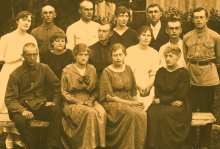
A FEW YEARS AGO, Ched Myers and I discovered this graffiti in my old suburban neighborhood in Saskatoon, Saskatchewan, scrawled across a fence just a block from where I grew up:
“... as long as the sun shines,
as long as the waters flow downhill,
and as long as the grass grows green ...”
It is a venerable phrase from the Two Row Wampum of 1613, an agreement between the Five Nations of the Iroquois and representatives of the Dutch government in what is now upstate New York, which affirmed principles of Indigenous self-determination, rights, and jurisdiction. The phrase has been reiterated in most subsequent treaties between European settlers and Indigenous Peoples in Canada.
Sixty miles due north of my old neighborhood is Opwashemoe Chakatinaw (named Stoney Knoll by settlers), nestled between the North and South Saskatchewan Rivers. A spiritual center for the Young Chippewayans, it was part of Reserve 107, assigned to this Cree tribe in 1876 under Treaty 6.

FOR WEEKS (that felt like years), many of us were torn between almost-obsessive tracking of polls, debates, tweets, and divisive campaign rhetoric—and a heartfelt desire for anything-but-the-election. Because, of course, so much of life isn’t wrapped up in partisan electoral politics, as important as elected officials and public policies are for the well-being of all of us and our earth. This issue of Sojourners reflects that tension: While we feature perspectives on the presidential election and what’s ahead politically, we also offer reflections on matters not bound by four-year cycles.
Climate music, baby Yoda, women in church leadership, and more on this week's Wrap.
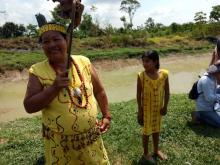
More than two dozen indigenous women leaders from across the Madre de Dios region of the Peruvian Amazon met to share their experiences.
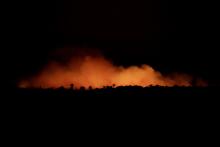
What we need now is to #PrayfortheAmazon — to lament the devastation to the creatures and to our climate. We need to talk about the loss in our churches, singing and praying in community. Then we need to have the courage to mobilize and save what’s left of this beautiful world.
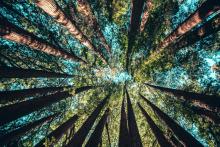
As we continue to enter deeper into the crisis of climate change, into the reality of human rights abuses and eruptions of violence happening not just here but all over the world, perhaps we need to take a different approach in our relationship to one another and our creature-relatives all over the earth.

A few days ago, I gathered with my two Potawatomi sons on our couch to watch Molly of Denali, a cartoon that recently premiered on PBS starring a young girl named Molly who is an Alaska Native (specifically, Gwich’in/Koyukon/Dena’ina Athabascan). This show is the first of its kind in the history of the United States.
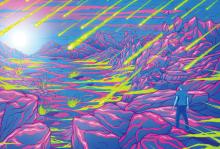
I HAVE WORKED WITH progressive Christians for a very long time, and I’ve noticed that too much talk about heaven seems to embarrass them.
Many people I’ve encountered have been eager to talk about the gospel of social justice but much less enthusiastic talking about eschatology. They seemed happy, for example, to talk about the feeding of the 5,000, but not so much about the Book of Revelation or the apocalypse.
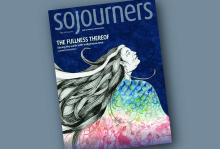
MAYBE YOU’VE HEARD a land acknowledgement at a conference, sporting event, or worship service. These brief statements name the Indigenous territory on which an event takes place, a small sign of respect to the people who stewarded this land for millennia and whose deep relationship to the land continues today. For any of us who’ve settled on that land, these statements are intentionally unsettling, a way “to counteract the ideologies operating in the Doctrine of Discovery by naming that the land was not empty when Europeans first arrived,” as one group of Canadian churches put it.
But land acknowledgements become trite—an easy checkmark in the social justice box—if they are not part of ongoing relationships with local Indigenous communities. These relationships must include settlers being quiet and listening to some hard truths from Indigenous people about history, responsibility, and reparations.

CHANGE YOUR LENSES, please. Okay, maybe you can’t simply change lenses right now, but would you at least notice the lenses you are currently wearing? If you are like, say, 99.9 percent of us in the U.S., you have been influenced by a very particular set of perspectives that interpret life from an Enlightenment-bound Western worldview.
All of our lenses have various perspectival tints, but Western worldviews seem to have several in common, including the foundational influence of Platonic dualism, inherited from the Greeks. This particular influence absolutizes the realm of the abstract (spirit, soul, mind) and reduces the importance of the concrete realm (earth, body, material), disengaging them from one another. In dualistic thinking, we are no longer an existing whole.
Western worldviews tend to have other related assumptions—such as hierarchy, extrinsic categorization, individualism, patriarchy, utopianism, racism, triumphalism, religious intolerance, greed, and anthropocentrism. But the influence of dualism empowers these other concerns.
What difference would it make if life were viewed instead as a fundamental whole, if the earth itself were seen as spiritual? And how would such a worldview square with Jesus’ approach to such matters?